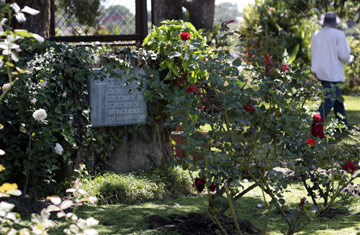
A memorial plaque inscribed with the names of the six Jesuit priests that were assassinated by Salvadoran soldiers on November 16, 1989, is seen above the rose garden that was created on the spot where they were executed
Carlos Martín Baró believes that his brother Ignacio knew he was about to be killed. The night before his murder Nov. 16, 1989, the 46-year-old Jesuit priest called his parents in Spain from his home on the campus of the University of Central America in El Salvador. On the phone, he tried to calm his father's concerns about his safety with a joke about being surrounded by the military and therefore well-protected. But, as it turns out, it was the Salvadoran military itself that was to fear. The following morning, they had allegedly massacred Ignacio Martín Baro, along with five other Jesuits, their housekeeper, and her daughter. "I think that call was my brother's way of elegantly saying goodbye," says Carlos today.
It has taken 22 years, but the men accused of that crime may soon stand trial, albeit far from home. Invoking universal jurisdiction in crimes so heinous that they justify prosecution without regard to territorial boundaries, the Spanish National Court on May 30 issued an international arrest warrant for 20 formerly high-ranking leaders of the Salvadoran military for their alleged role in the massacre. Now it only remains to be seen whether that warrant can be enforced.
At the time of the massacre, El Salvador was engaged in a ferocious civil war that pitted the U.S.-backed government against leftist rebels. The six Jesuits killed — five of whom were Spanish — had been pressuring the government to negotiate with the rebels. After the murders, the Salvadoran government initially tried to pin the blame on the rebels, but it quickly became clear that the massacre had been planned and executed under military orders. Several of the 20 men indicted in the Spanish order — including Rafael Humbert Larios, El Salvador's defense minister at the time, and Inocente Orlando Montano, then deputy minister of public safety — are considered "intellectual authors" of the crime and were not among those were tried and exonerated by a Salvadoran court in 1991.
In his 77-page order, Spanish National Court judge Eloy Velasco called that earlier trial "defective" and noted that the U.S. had officially condemned it as "a parody of justice." In his statement, Velasco demands that 19 of the accused (René Emilio Ponce, who as the Salvadoran army's chief of staff at the time is believed to have ordered the attack, died earlier this month) turn themselves over to local authorities in the next ten days, where they will await extradition.
And that is the factor on which the future of this case hinges. In the past, the Spanish National Court has heard cases against Chinese officials for their attacks on Tibetans; against the U.S. for torturing prisoners at Guantánamo; and against Guatemalan leaders for their execution of an estimated 200,000 Mayans during the country's 36-year civil war. Under the court's international warrant, British police arrested Chile's former dictator Augusto Pinochet, and in 1998 the court condemned Argentina's notorious naval officer Adolfo Scilingo to 30 years in prison. Yet despite being the world's foremost practitioner of universal jurisdiction, the court has been successful in seeing through only a tiny handful of cases. In many instances, such as that of Guatemala, the cases have faltered on the refusal by other countries to recognize the Spanish court's authority and extradite the indicted.
And indeed, Spain itself recently restricted its own authority to prosecute cases abroad. In the wake of a 2009 case brought against Israeli army officers for their actions in Palestine, the Spanish parliament reformed the law concerning universal jurisdiction, restricting its application to cases in which no other competent court has begun proceedings, and where either the alleged perpetrators are present in Spain, the victims are of Spanish nationality, or there is some relevant link to Spanish interests.
In the case of the Jesuit murders, the fact that five of the six men killed in El Salvador were Spanish nationals helps the court establish its competency. And it's part of the reason prosecuting international attorney Almudena Bernabeu, whose San Francisco-based organization, the Center for Justice and Accountability, filed the suit with the National Court, is hopeful that the accused will soon be seated in a Spanish courtroom. "I can't tell you that we've had clear signs that the Salvadoran government is going to honor the order," Bernabeu says. "But Spain and El Salvador do have an extradition agreement, and the current [Salvadoran] government has shown itself open to revisiting the case. We may not get all of the accused to Spain, but I am certain that at least some of them will be judged."
For the Society of Jesus, that news is welcome. But the society emphasizes its desire to see more trials in El Salvador itself. In a statement issue to TIME, the Jesuit office in Spain writes: "We hope that this will not be the last word in justice because that would leave out the numerous Salvadorans who were murdered for the same reasons as our colleagues."
Carlos Martín Baró knows the brother he lost all those years ago would feel the same way. Still, he feels the Spanish trial is important.. "My hope is that these men will be judged" he says. "Not out of vengeance, but because it's important, for the Salvadoran people, and for the rest of us. Our humanity depends on justice."
